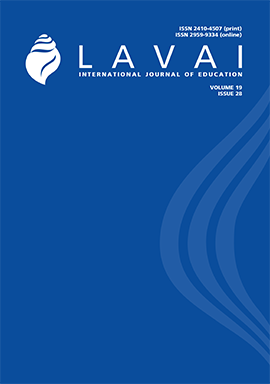Studying the relationship between students' self-efficacy and social adaptation
DOI:
https://doi.org/10.5564/lavai.v19i28.3242Keywords:
student, self-efficacy, social adaptationAbstract
This study examined the relationship between student self-efficacy and social adaptability. Our research is innovative in that it examines the relationship between social adaptability and self-efficacy, which is one of the soft skills considered to be important skills of the 21st century. 2,713 students from five universities of Inner Mongolians participated in the study. According to the results of the research, the student's social adaptation in 7 parameters (learning, "I" with people, professional choice, self-reliance in life, environment, somatic mental characteristics) is above average or good (M=3.68), self-efficacy is above average for all students (M=2.58). Also, according to the results of the T-test analysis of self-efficacy, there is a difference between genders (p = 0.001), i.e. male students have higher self-efficacy and social adaptation. The total score of social adaptation of male and female students (p = 0.049) and their environment overall acceptance (p=.001) is different depending on gender, the total score of social adaptation (p=.008) and learning adaptability (p=.000), adaptability with people (p= .010), adaptability of "I" (p=.000), adaptability to career choice (p=.009) are different to a certain extent. Also, social adaptation and self-efficacy have a moderately positive correlation (r=.329), and self-efficacy affects social adaptation by 10.8% (ΔR² = 0.108).
Оюутны өөрийн үр дүнт шинж болон нийгмийн дасан зохицохуйн хамаарлыг судалсан нь
Хураангуй: Энэхүү судалгаа нь оюутны өөрийн үр дүнт шинж болон нийгмийн дасан зохицохуйн хамаарлыг судалсан. Бидний судалгаа нь XXI зууны чухал чадварт тооцогдож буй зөөлөн ур чадварын нэг болох нийгмийн дасан зохицохуй болон өөрийн үр дүнт шинжийн хамаарлыг судалсан нь шинэлэг талтай. Тус судалгаанд ӨМӨЗО-ы таван их сургуулийн 2713 оюутан оролцсон. Судалгааны үр дүнд оюутны нийгмийн дасан зохицохуй нь долоон үзүүлэлтийн (суралцахуйн, хүмүүстэй, ”Би”-ийн, мэргэжил сонголтын, амьдралд бие даах, хүрээлэн буй орчинд, соматик сэтгэцийн шинж) хувьд дундаж нь (M=3,68) дунджаас дээгүүр буюу сайн , өөрийн үр дүнт шинж нь нийт оюутнуудын хувьд (M=2.58) дунджаас дээгүүр байна. Мөн өөрийн үр дүнт шинжийн Т тестийн шинжилгээний үр дүнд хүйсийн хувьд ялгаатай (p = 0.001) буюу эрэгтэй оюутнуудын өөрийн үр дүнт шинж өндөр, нийгмийн дасан зохицохуйн хувьд Эрэгтэй, эмэгтэй оюутнуудын нийгмийн дасан зохицохуйн нийт оноо (p=.049) болон хүрээлэн буй орчноо цогцоор нь хүлээн зөвшөөрөх чадвар (p =.001) нь хүйсээс хамааран ялгаатай, хот, хөдөөгөөс шалтгаалаан нийгмийн дасан зохицохуйн нийт оноо (p =.008) болон суралцахуйн дасан зохицох чадвар (p=.000), хүмүүстэй дасан зохицох чадвар (p =.010), “Би”-ийн дасан зохицох чадвар(p=.000), мэргэжил сонголтдоо дасан зохицох чадвар (p=.009) зэрэг нь тодорхой хэмжээнд тус тус ялгаатай байна. Мөн нийгмийн дасан зохицохуй болон өөрийн үр дүнт шинж нь (r =.329) дунд зэрэг эерэг хамааралтай , өөрийн үр дүнт шинж нь нийгмийн дасан зохицохуйд 10.8% (ΔR² = 0.108) -р нөлөөлж байна.
Түлхүүр үг: оюутан, өөрийн үр дүнт шинж, нийгмийн дасан зохицохуй
Downloads
413
References
Klaus, P. (2003). The hard truth about sofft skills. Boston: Clledwell publishing.
Xiefeng, L. (2003). Compilation and Standardization of College Students' Adaptability Scale.
Xiuling, S. (2008). Research on Role Adaptation and Mental Health of College Freshmen.
Aiqin, L. (2008). College students career maturity and emotional intelligence:the mediating role of self-efficacy. Journal of peking university (Natural science edition), 44.
Bandura, A. (1997). Self-Efficacy:The exercise of control. New York: Freeman.
David, T. (2003). The Spirituality Revolution: The Emergence of Contemporary. Sydney: harber Collins Publisher.
Deepa, S. (2013). Do Soft Skills Matter?-Implications for Educators Based on Recruiters’ Perspective. The IUP Journal of Soft Skills, 11-13. doi: https://ssrn.com/abstract=2256273
Fuqun, X. (2018). Social mobility, urban-rural background and urban social adaptation of working college graduates——Based on a questionnaire survey of cities across the country. Jinyang Academic Journal, 3. https://doi.org/10.16392/j.cnki.14-1057/c.2018.03.010
Jerusalem, M; Schwarzer, Ralf. (2012). The general Self-Efficacy scale (GSE). ResearchGate, 4. doi:12:329-345
Kang, Wang Cai; Hu, Zhong Feng; Liu, Yong ;. (2001). Evidences for reliability and validity of the Chinese version of general Self-Efficacy scale. Chinese Journal of Applied Psychology, 37-40.
SiXiuling. (2008). Characteristics and Influencing Factors of Adolescents' Social Adaptation Behavior. Journal of Capital Normal University Social Science Edition.
Z, Ran; Nisar, F; Zeb, S; Poulova, P;. (2022). The impact of emotional intelligence on career decision making difficulties and generalized Self-Efficacy among university students in China. Psychological research, 68-72. https://doi.org/10.2147/PRBM.S358742
Батболд , Ш. (2022). Амьдралын психологи II. Улаанбаатар: Тэпэ.
Батболд, Ш. (2012). Оюутны дасан зохицоог судалсан нь. Улаанбаатар: МУИС.
Даваа, Ж. (2017). Боловсрол судлал. Боловсрол судлал, 135-139. Улаанбаатар: МУИС хэвлэл.
Нямгэрэл, Д. (2017). Оюутны сэтгэл зүйн дасан зохицолыг судалсан нь. Улаанбаатар: МУИС.
Downloads
Published
How to Cite
Issue
Section
License
Copyright (c) 2023 Namier Ulziibayar

This work is licensed under a Creative Commons Attribution 4.0 International License.
Copyright on any research article in the Lavai - International Journal of Educatioin is retained by the author(s).
The authors grant the Lavai - International Journal of Educatioin a license to publish the article and identify itself as the original publisher.

Articles in the Lavai - International Journal of Educatioin are Open Access articles published under a Creative Commons Attribution 4.0 International License CC BY.
This license permits use, distribution and reproduction in any medium, provided the original work is properly cited.




